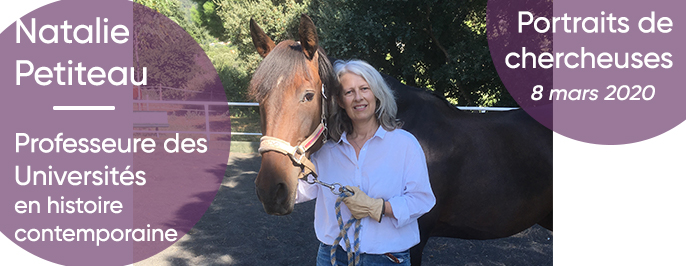[Portrait] Natalie Petiteau, University Professor of Contemporary History

What is your research about?
After having worked on the First Empire and its shadow on the 19th century, in approaches essentially related to social and political history, I am now turning to the history of the performing arts in the 19th and 20th centuries. By linking my passion for history and my passion for horses and riding and following my meeting with the Alexis Gruss Company, I am now working on the history of the circusThis is the first time that the circus has been used as a place of expression for the Napoleonic legend in the middle of the 19th century, while in the 1930s, the circus world was working to abolish borders when the States were building them. The ring was a place of expression for the Napoleonic legend in the mid-19th century, while in the 1930s, the circus world worked to abolish borders when states erected them as barriers.
What are your current scientific activities?
A first book on the history of the Alexis Gruss Company was published in 2018, under the title The builders of the ephemeral. I am currently on a Leave of Absence for research and thematic conversion and, while using this time to accumulate photographs of archive holdings, I am preparing papers for study days. A first work on "Bodies sublimated in the "Opera of the Eye"". will be presented in Aix-en-Provence in March 2020. Another on "The horse on the track: education, sublimation, attention (1768-2020)This paper will be proposed to the EHESS in June 2020. I am also working on an article on the role of the track in spreading the Napoleonic legend. Finally, I plan to set up a database on fairground artists.
Why did you choose to work in academic research?
For me, it was more an obvious choice than a choice. Having always been passionate about history, since primary school, it was natural for me to make it my profession by taking the CAPES and agrégation exams. Having passed these exams without difficulty, I continued with my thesis without question, because the passion for history can only be satisfied by going to the sources. Once the thesis was obtained, it was also natural to apply for a teaching-research post, which was also obtained on the first try. In the 1990s, this seemed to be the best way to combine a passion for research with a desire to pass on knowledge to younger people.
What advice would you give to students who want to do research?
We must not be taken in by the smoke and mirrors. There are very few jobs in research, and in any case, working at the university today means above all being overwhelmed by tedious administrative tasks that take away from research. "Doing research" is a job that no longer exists except in the interstices of our professional lives, except perhaps in the large structures or at the CNRS. So I would say to the younger people to give themselves the means to get a job like thisThis reduces the possibilities even further. I am in fact very pessimistic about the future of historians in our society, little listened to, badly considered, not often helped.
Which object or image from your research best illustrates you?
Here is a programme of the "New Circus which illustrates the place that the horse occupied in the show at the time, which attracted not only a popular audience, fond of the exploits of, for example, the clowns Footit and Chocolat who performed on the morning of 22 December 1889, but also an aristocratic and bourgeois audience, eager to contemplate the equestrian performances. The advertisement on the left-hand page testifies to the still very elitist nature of the circus at the time.

Mis à jour le 22 December 2022